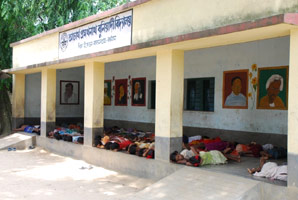Education
MANJUSHA TARANGINI SISHU BHAVAN

This section caters to children in the age group of 3-6 years. It can accommodate up to 60 children in the present set up. There are 6 dedicated teachers who run the play school where basic education is imparted and the students are prepared for primary school through regular lessons as well as an entire set of extra-curricular activities like music, dancing, drawing and painting and other educative games, nature study and so on. These students also receive basic training in acting. They have even staged simple dance dramas. The students are taken out for picnics and also participate in annual sports. These children are so deeply initiated into hygiene and sanitary practices that they in turn convey these habits to their parents and elder siblings. One computer has been installed here to provide some kind of entertainment to the children.
ACHARYA PRAMATHANATH BUNIYADI VIDYALAYA

This institution caters to children in the age group of 6 to 14 years. The number of students here is more than 200. There are 14 dedicated teachers. Apart from the conventional curriculum, the teaching also includes various other modes of painting, singing, acting, elocution, debate. Interestingly the students are also trained in using the spinning wheel to improve their concentration, pottery, carpentry, tailoring , agriculture as well as computers. The students are encouraged to run their own show through an elected council of ministers from amongst themselves, who are elected every month. They are responsible for maintaining discipline, cleanliness, cooking and serving the mid-day meals and also resolve all disputes with the help of their teachers. There are dedicated boys’ and girls’ hostels. They are also taken out for excursions, participate in sports and observe various cultural events.
NIBEDITA BHAVAN
This is a short stay home for women in moral danger. This is housed in a separate building . About 30 inmates are accommodated here for a maximum period of three years. Attempts are made to make them self reliant and somewhat financially independent, to enable them to return to mainstream society. They receive training in embroidery, tailoring, book binding, durree work etc. Most of the inmates from this home have been rehabilitated over the years including some who had suffered from severe mental disorder.